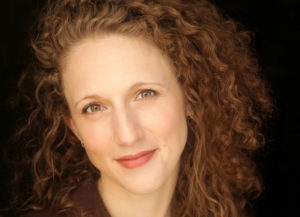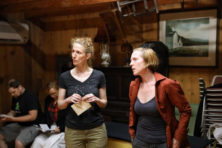Peninsula Players Presents Gender Twist with ‘Miss Holmes’
- Share
- Tweet
- Pin
- Share
Peninsula Players Theatre draws the curtain closed on its 2017 “The Play’s the Thing” winter play reading series with a modern twist on Sir Arthur Conan Doyle’s most popular character with the new play, Miss Holmes.
As its title suggests, this new murder mystery – by Chicago playwright and actor Christopher Walsh – is a gender-bent take on Doyle’s beloved stories about 19th century detective Sherlock Holmes and his friend and biographer Dr. Watson. Set during the same time and place as the original stories, Miss Holmes gives audiences a rare glimpse into the social and domestic constraints placed on women in 19th century England – in this case, the intelligent and independent Sherlock Holmes and her dear friend, Dorothy Watson.

Actress Cassandra Bissell, who plays the role of Sherlock Holmes in Christopher Walsh’s “Miss Holmes.” Submitted photo.
The foundation of the story is built on the women’s shared experience of being unconventional and looked down upon by a society intolerant of female rebellion and accomplishments outside of the home. Holmes’ fascination with intellectual problems, deemed inappropriate by her family (including her brother, Mycroft), regularly leads her to the confinement of mental institutions. In the meantime, Dr. Dorothy Watson – one of the first women to pass the medical examinations in Edinburgh, Scotland – struggles to make a difference at the one London hospital that will hire female doctors. Underlining her personal and professional struggles is a looming marriage proposal.
Assuming the lead roles are Peninsula Players veteran Cassandra Bissell (as Sherlock Holmes) and Maggie Kettering (as Dr. Watson). While both actresses assure classic Sherlock Holmes fans that the lead characters in this version maintain the same personality traits as the traditional males of Doyle’s stories, their relationships with family and society are noticeably different.
“Holmes’ relationship with her brother Mycroft is very different because Mycroft has the power as the male to really take away any independence and any agency Holmes has in her life,” Kettering said. “And because she is so quirky she is seen as a hysterical woman and someone who needs to be protected and thrown into an asylum if ever she oversteps societal boundaries and Dr. Watson should be settling down and getting married and as soon as she does this she would lose also all of her agency and her independence. Instead of in the traditional stories where Watson looks forward to getting married, it’s the exact opposite here because if Dr. Watson were to get married she would have to then stop practicing and stop any kind of life outside of the home which I think is again just a really interesting twist on how we see the story of Watson and Holmes and also an inside into what was going on in the day.”
Bonded by this shared experience, Holmes and Watson work together to help a woman in distress whose husband has been cleared of involvement in the drowning death of his second wife, leaving inspector Geoffrey Lestrade suspicious of the husband’s innocence.

Maggie Kettering, who performs as Dr. Watson in Peninsula Players reading of “Miss Holmes” by Chicago playwright Christopher Walsh. Submitted photo.
“It’s a really interesting script in the sense of in the traditional Sherlock stories, he is always coming to the aid ultimately of people who are not able to get help through standard means…they have secrets or whatever and this playwright has taken that and specified that to cases of women who, because they are women in the Victorian era, are not able to go through standard means simply because of their gender,” Bissell explained. “They are not able to seek the support and the help and they are dismissed because of their sex. It’s taking the traditional storyline…but adding this other layer of coming to the aid of women who at this period in time don’t have other resources that they can depend on.”
Bissell and Kettering will be joined by Amy Ensign, Anne Herring, Neil Brookshire, Mark Moede, McKinley Carter, James Krag, Chad Luberger and Peninsula Players artistic director Greg Vinkler.
With Sherlock Holmes enjoying a sort of Renaissance with modern versions of this beloved tale, and theater in general enjoying renewed interest and updated tellings of both classic and rarely told stories featuring minorities and females in lead roles, Kettering is excited to make her mark with the upcoming Peninsula Players reading.
“I find it really interesting to be able to tell something like this where you’re telling an old story that we all know and just changing one element and it completely alters the story or our perception of it,” she said. “As a female actor in classical theater, there are always fewer roles for women, that’s just how those older plays are written, and to be able to have the opportunity to play these kind of really great, classic, incredibly well written characters as a woman is really exciting to me because I think it brings a really cool dose of modern sensibilities into stories that we do love and we do still want to see that are still exciting to us as a modern audience…I think it’s the same thing that Hamilton has hooked onto. Great stories are great stories but today it’s really important and exciting to see voices who haven’t always been heard telling these great stories.”
The free reading begins at 7 pm on Monday, April 3 at Björklunden, 7590 Boynton Lane, Baileys Harbor. General seating is available.


